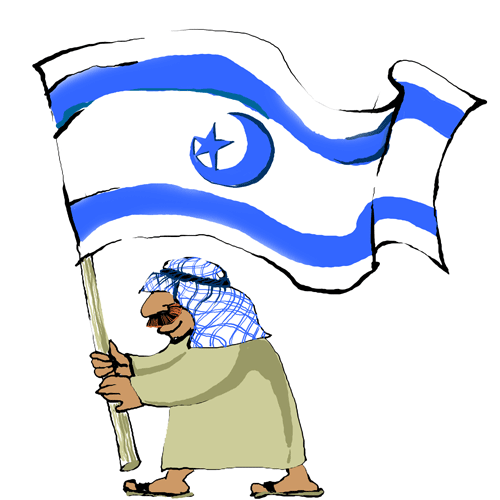The fifth column is made up of well learned, affluent Arabs, not the supposed ‘disenfranchised’.
Israel’s Arabs: Deprived or Radicalized?
by Efraim Karsh
Israel Affairs
January 2013, pp. 1-19
 October 1, 2000, was a watershed in Arab-Jewish relations in the state of Israel. On that day, as most Israelis were celebrating the Jewish new year, their Arab compatriots unleashed a tidal wave of violence in support of the ‘al-Aqsa intifada’, an all out war of terror launched by Yasser Arafat’s Palestinian Authority a couple of days earlier.
October 1, 2000, was a watershed in Arab-Jewish relations in the state of Israel. On that day, as most Israelis were celebrating the Jewish new year, their Arab compatriots unleashed a tidal wave of violence in support of the ‘al-Aqsa intifada’, an all out war of terror launched by Yasser Arafat’s Palestinian Authority a couple of days earlier.
For full ten days, Israeli Arabs blocked several main roads, cutting off Jewish localities and forcing some of them to defend against armed assaults by neighbours with whom they had maintained cordial relations for decades. Scores of Jewish families spending the holiday season in the Galilee found themselves attacked by frenzied Arab mobs wielding Molotov cocktails, ball bearings in slingshots, stones, even firearms. Stores, post offices, and other public places were ransacked as rioters clashed with police. Forests were set ablaze. In Nazareth, thousands of Arabs marched in the streets chanting, ‘With our souls and our blood we will redeem Palestine’. Jaffa and Haifa, the showcases of Arab-Jewish coexistence, were rocked by violence and vandalism.
Shaken to the core, the Israeli government headed by Ehud Barak, who only days earlier had hosted Arafat in his private residence for what he described as ‘a very good, warm, and open meeting’,[1]apologized to the thirteen rioters killed in violent clashes with the police and appointed an official commission of inquiry headed by deputy chief justice Theodore Orr to investigate the events. Submitting its official report at the end of August 2003, long after Barak had been swept from power, the commission acknowledged the riots’ strong chauvinistic impetus, noting grimly that ‘Jews were attacked on the roads merely for being Jewish and their property was destroyed. In a number of incidences, they were just inches from death at the hands of an unrestrained mob’. And it rebuked Israeli Arab leaders not only for failing to direct their grievances into democratic, rather than violent, channels but also for having worked over the years to delegitimize the state and its institutions in the eyes of their constituents:
Messages transmitted prior to and during the October disturbances blurred and sometimes erased the distinction between [on the one hand] Israel’s Arab citizens and their legitimate struggle for civil rights and [on the other hand] the armed struggle against Israel by organizations and individuals in Judea, Samaria, and Gaza. More than once, the two struggles were presented by leaders of the Arab community as a single struggle against one adversary, if not an enemy. The concept of citizenship is incompatible with the presentation of the state as the enemy; with practises that treat the state and its legitimate institutions as an enemy; or with praising violent activities by the state’s enemies against the state and its citizens.[2]
Yet even while denouncing such actions as ‘incompatible with the loyalty owed by citizens to their country’, the Orr commission refrained from proposing disciplinary measures against Israeli Arab leaders who had incited their constituents to violence. Instead, it attributed the volcanic eruption to something else entirely – namely, a longstanding callousness on the part of the Israeli establishment itself towards the state’s Arab minority:
The state and successive generations of its government have failed to address in a comprehensive and deep fashion the difficult problems created by the existence of a large Arab minority inside the Jewish state. Government handling of the Arab sector has been primarily neglectful and discriminatory. The establishment did not show sufficient sensitivity to the needs of the Arab sector, and did not do enough to give this sector its equal share of state resources. The state did not do enough or try hard enough to create equality for its Arab citizens or to uproot discriminatory or unjust practices.[3]
Behind this self-incriminatory diagnosis lay the conviction that Arab resentment and distrust of the Jewish state were corollaries of socioeconomic deprivation and that with growing affluence, such feelings would be supplanted by their opposites. The fact that Arab enmity had not given way, but on the contrary had intensified, was thus seen as proof that the ‘Arab sector’ had been a victim of official discrimination and had yet to receive ‘its equal share of state resources’.
Unfortunately, this theory is false in general, and especially false in this particular case. In the modern world, it is not the poor and the oppressed who have led the great revolutions and/or carried out the worst deeds of violence; rather, it is militant vanguards from among the better educated and more moneyed circles of society. So it was with the Palestinian Arabs – in both mandatory Palestine and the state of Israel. The more prosperous, affluent, and better educated they became, the stronger and more vociferous their leaders’ incitement against their state of citizenship, to the point of open rejection of the fundamental principles underpinning its very existence. But to understand this requires a look back at the history of Arab-Jewish relations during the past century.


As much as I appreciate the individual efforts of Arabs to contribute to the welfare of the Jewish state, I do consider a large part of the Arab Israeli’s to be a fifth column. Not that long ago, students were protesting for ‘Palestine’, while rockets from Gaza were shot at Israeli civilians. It is the typical ‘bite the hand that feeds you’ attitude that has been so persistant in the Arab sector. Here, by the way, is a piece by Blogwrath on the Arabs in Jerusalem: //www.blogwrath.com/trip-to-israel/the-peculiar-israeli-arabs-of-jerusalem/3746/